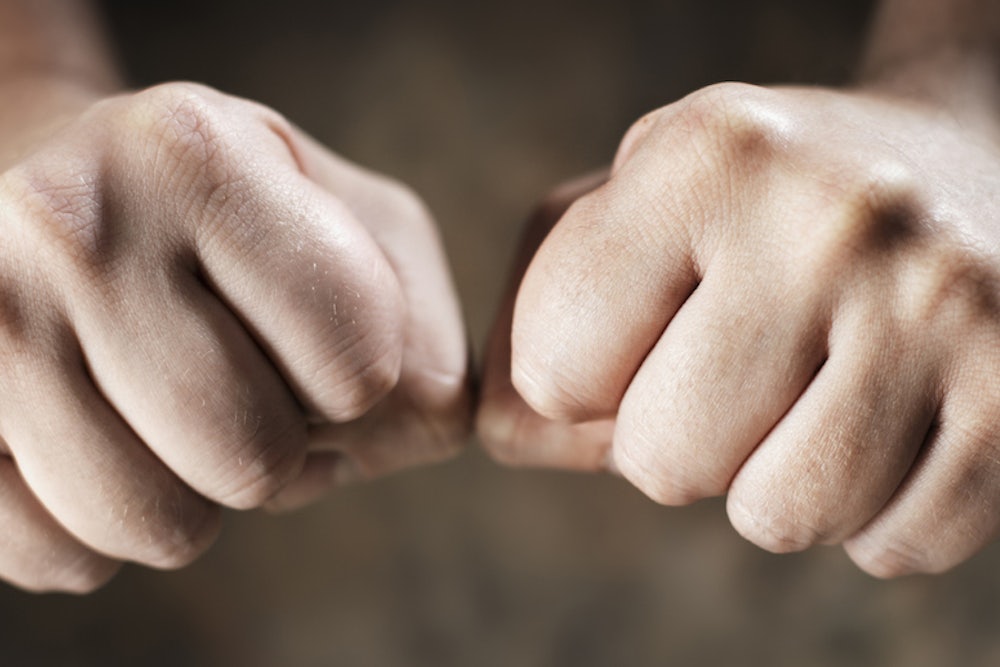In a recent piece, Alice Robb reported on the rapid rise of the Public Library of Science, or “PLOS,” a non-profit that produces a handful of journals that have abandoned traditional peer review in favor of a more freewheeling approach to the dissemination of scientific knowledge. Occasionally, it backfires.
One April 24, 2013, a group of researchers from Montclair State University published a study on the open-access journal PLOS ONE with a shocking claim about memory: Simply clench your right fist before memorizing information, and clench your left fist as you want to recall it.
The study participants were split into groups and asked to memorize a list of words. One group clenched a ball in their right fist when reading the words, and again when recalling them. Another group did the same, but with their left fist. Two other groups started in one fist and switched to the other. A final group didn’t clench their fists at all. The researchers concluded that the right to left combination produced the best results, and attributed this to the clenched fist triggering the opposite hemisphere of the brain.
Over the following days, the study was picked up by a slew of outlets, including TIME, The Atlantic, International Business Times, The Los Angeles Times, the BBC, the Discovery Channel, and New York Daily News. (It inspired plenty of cringe-worthy headlines about “handy” tricks and “getting a grip.”) The headlines also spanned a range of certainty when referring to the study:

News outlets and forgetful readers took to Twitter to enthusiastically share the findings:
A new study suggests that clenching your fist can help form memories and recall them later. Read more: http://t.co/PBLfSaAKz9
— Discovery (@Discovery) April 29, 2013 This could be great for forgetful folks like me (if I could remember which fist to clench first). By @montemorin http://t.co/NT9n0eKHWj
— Karen Kaplan (@LATkarenkaplan) April 25, 2013
While others were more skeptical:
Wondering which fist to clench so you remember not to send your bad science off to an OA journal? http://t.co/AtthYeCTLn
— Ian Kellar (@DrIanKellar) April 28, 2013
PLOS doing utmost to undermine credibility of OA publishing: Clenching fists almost certainly won't help your memory http://t.co/44yLdyWW8V— Jon Simons (@js_simons) April 27, 2013
One angry critic, Dr. Jon Simons (tweet above), wrote a scathing response post in the comments section of the original article on PLOS ONE, entitled “fist-clenchingly poor science.” He detailed many issues with the study, but perhaps most important, he said: “The entire premise of the study lacks foundation.” He explained that there was no evidence that fist-clenching even activates the areas of the brain associated with memory. On top of that, the sample sizes—as low as 9 participants—were simply too small to be significant.
This, in turn, prompted a response from the authors of the study, attempting to refute each of his objections individually. (At the bottom of the post is a puzzling claim: “No competing interests declared.”) Then, they subtly shift the blame: “Finally, we would like to point out that our research should not be conflated with media reporting of such research.”
Some supporters of open access—and of the particular study—came to its defense, by way of responses to Simons's post. A professor named Kate Jeffery opened a reply with: "Remind me never to submit my work to an open-commentary journal!" She complained that the post was mean-spirited, adding: "Sometimes the work done to correct [these mistakes] leads to other findings. However, if people become afraid to present their work publicly [...] then we are all the poorer for it." Another professor, John Anderson, demanded that Simons's post be removed, but PLOS ONE declined, in the interest of balance.



